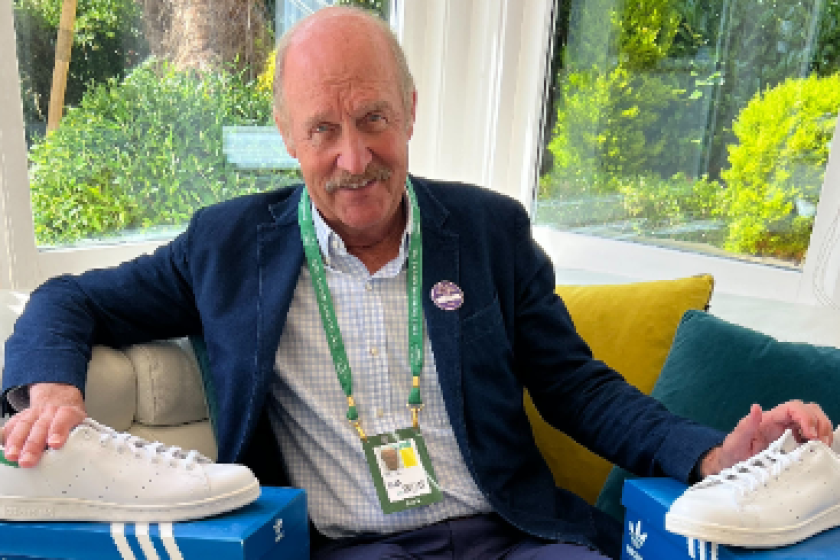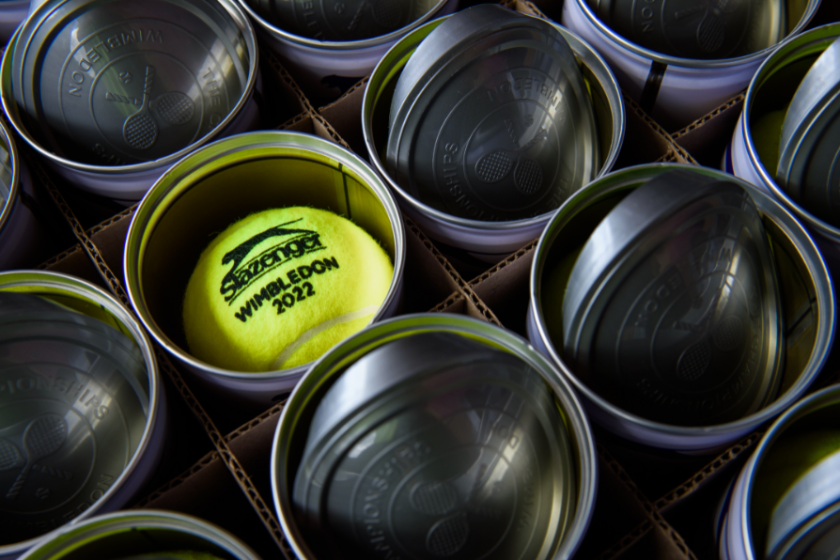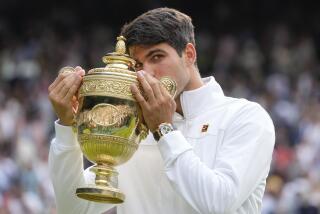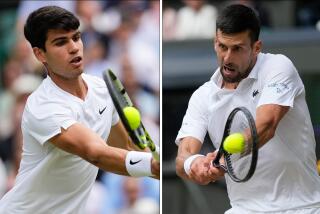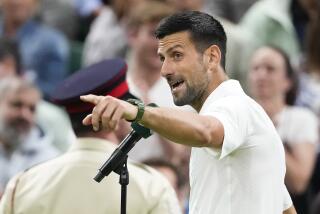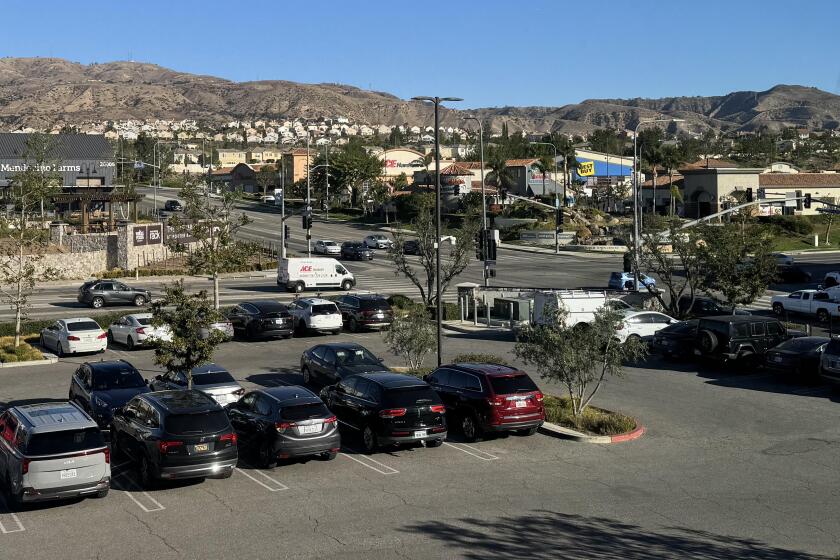Novak Djokovic beats Nick Kyrgios in four sets to win Wimbledon title
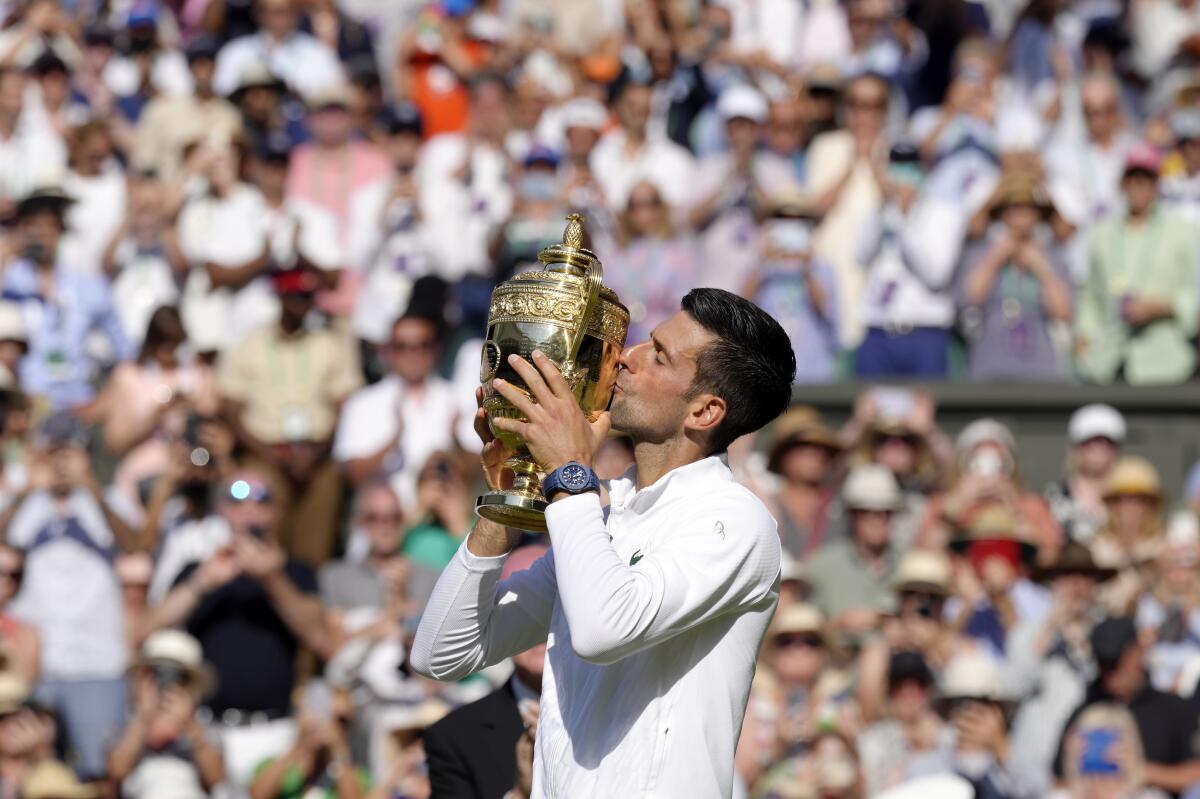
- Share via
WIMBLEDON, England — Sure, he was facing the toughest serve in tennis, but Novak Djokovic has a devastating return.
Return to Wimbledon. Win it all. Four times in a row.
After a match Sunday that felt both raucous and routine, the Serbian star lifted another championship trophy, winning his seventh Wimbledon men’s singles title by beating Australia’s Nick Kyrgios 4-6, 6-3, 6-4, 7-6 (3) on Centre Court, where Djokovic has not lost since 2013.
“This tournament has a special place in my heart because it’s always been my childhood dream tournament,” said Djokovic, who collected his 21st Grand Slam event championship, topped only by Rafael Nadal’s 22 among men’s players all time. Only Roger Federer owns more Wimbledon men’s titles than Djokovic with eight.
The chaotic part of Sunday’s match was what was happening with the combustible Kyrgios, playing in his first Grand Slam final. He’s the tall, lanky, tattooed bad boy of tennis with a blistering serve, a scalding temper and — surprisingly to some — a great deal of introspection when he steps out of the crucible.
He played a tremendous final, at times giving Djokovic all he could handle, despite a series of tantrums in which he loudly chided his family and friends in the players’ box because they didn’t cheer him vigorously enough, dropped F-bombs like lobs — he received a warning for an audible obscenity — and asked chair umpire Renaud Lichtenstein to eject a fan who was distracting him.
Fifty years after Stan Smith won a singles title at Wimbledon, his signature shoe line with Adidas is as popular as ever and has become more hip, versatile.
“She’s drunk out of her mind in the first row, talking to me in the middle of the game,” he told Lichtenstein at full volume. “The one with the dress. The one who looks like she’s had about 700 drinks, bro!”
Wrote the Daily Mail: “Sportsmail is hearing that the ejected spectator is a lawyer who claims she had two drinks.”
Asked what impact the woman had on him, Kyrgios said: “I wouldn’t say she cost me the game. I’m playing the Wimbledon final against probably one of the best players of all time. I don’t need someone absolutely smashed talking to me point in, point out.”
Kyrgios, 27, lavished praise on the 35-year-old Djokovic, particularly for his poise under pressure.
“I feel like that’s his greatest strength,” Kyrgios said. “He just never looks rattled. He just looks completely within himself the whole time. Didn’t look like he was playing overaggressive, even though it felt like he was playing big.”
Kyrgios won their two previous meetings, both on hard courts in 2017, in straight sets. That gave him some confidence heading into Sunday’s match. Yet the experience disparity was wildly lopsided. Djokovic had been in this situation more than any other player in the modern era; this was his 32nd appearance in a Grand Slam tournament final. It’s all new to Kyrgios.
“The confidence and the belief in yourself, that only comes with achievement or something that he’s achieved like that many times,” Kyrgios said. “I can only imagine how confident he feels every day, especially at Wimbledon, walking around.”
Indeed, Djokovic looked perfectly at home after the match, walking around the reception area behind the royal box, chatting with William and Kate, the Duke and Duchess of Cambridge, and handing his golden trophy to young Prince George, who held it for a few moments before informing his mother, “It’s heavy.”
The thousands of balls used every year at Wimbledon might look identical to most, but they can have big differences from a player’s perspective.
Wimbledon has been a sort of Lourdes for Djokovic, healing what ails him. It was that way in 2018, when he began the year with elbow surgery before winning here, then the U.S. Open and Australian Open. It was like that again Sunday, seeing as he couldn’t play in the Australian because he was unvaccinated and the country quarantined him in a hotel for five days. He struggled to get back on track, then lost to Nadal in the quarterfinals of the French Open.
“I can say it was a … year,” said Djokovic’s coach, Goran Ivanisevic, using a word that would have been bleeped by TV. “A tough year, especially for him. Being there in Australia, everything after, it took a while to keep going and find his form. Then losing to Rafa — I mean, you can lose to Rafa anytime in Paris. But for me, he was a favorite here.”
That said, Ivanisevic, himself a past Wimbledon champion, called Kyrgios a “tennis genius” and the “best server in the game by far.”
“But also [Djokovic] knew on this stage, when Nick starts to talk, he’s going to be vulnerable,” he said. “You know what happened.”
Ivanisevic was referring to a critical point during the third set with the games tied at four. Kyrgios was serving and went ace, ace, service winner to go up 40-love. Then Djokovic won five points in a row as Kyrgios stormed over to his seat, turned to the players’ box and yelled, loud enough for everyone in the crowd of 15,000 to hear, “Forty-love, and y’all just relax every time! Why do you stop? Why? Say something! Why?”
Said Djokovic: “That 40-love game, he’ll probably be very upset with himself for losing that game. I didn’t win it; he lost that game with his unforced errors. I just stayed there and pushed him to the limit, and I got the reward.”
Although the two had played each other only twice before Sunday, the tension was thick between them for a long time. It only got worse before the Australian Open when Kyrgios referred to Djokovic on Twitter as “a tool.”
But the tide turned during the forced quarantine dust-up when Kyrgios stood up for Djokovic and criticized the way the Australian government was handling the situation.
“I feel like when I stood up for him, he was surprised,” Kyrgios said. “Ever since then, I feel like when the chips are down and someone comes out — what I did was not easy. I kind of went against my whole nation basically and spoke out about it.
“No matter how much you don’t like someone or how different they are, if they’re going to take arrows in the back for you in the public, then you’ve got to have ultimate respect for them.”
That mutual respect was evident after the match, when Kyrgios said: “He’s a bit of a god, I’m not going to lie.”
Hearing this, Djokovic conceded: “OK, it’s officially a bromance.”
Strangely, Kyrgios seemed to feel better after losing than he did in the stressful ramp-up to the final. He said he felt weird about gliding through the semifinal because of the injury withdrawal by Nadal, and that he got two lousy nights of sleep leading into his match against Djokovic.
“I feel like I lost this match, but I feel like there’s just weight off my shoulders,” Kyrgios said. “I feel like there’s so much weight on my shoulders all the time when I step out on the tennis court. Now it’s just released and I feel amazing. This is the best I’ve felt the two weeks.”
He said that a month ago, while playing a pickup basketball game back home in Australia, he told a friend he was going to have some fun at Wimbledon and maybe even win it.
“Then, I’m here as a finalist,” he said. “Like, I didn’t hit more than an hour a day. … I look back at it, and I’m just like: ‘How am I here? How am I here?’ You know, it’s pretty cool.”
More to Read
Go beyond the scoreboard
Get the latest on L.A.'s teams in the daily Sports Report newsletter.
You may occasionally receive promotional content from the Los Angeles Times.

